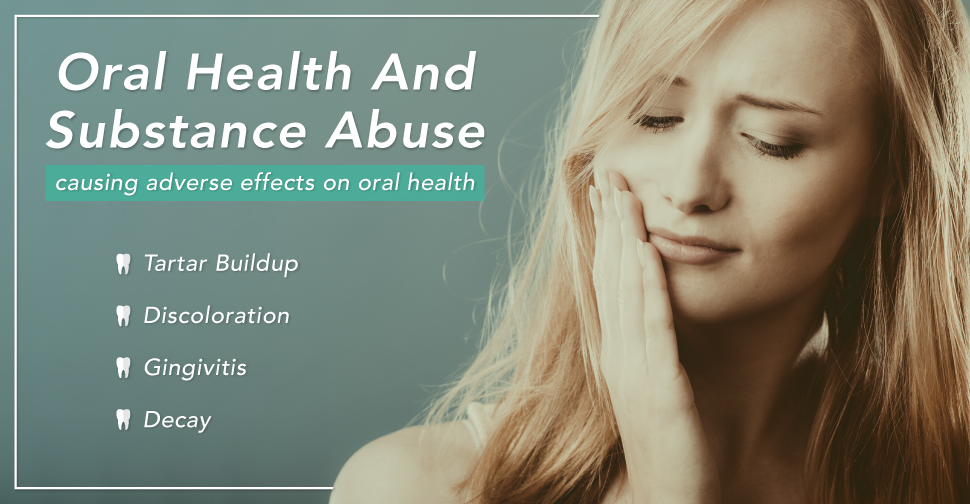
Maintaining a healthy smile is an important part of daily routine for many people. Numerous studies have shown a correlation between oral health and overall health, making the effort to protect teeth and gums that much more important. Oral health tends to suffer as a result of substance abuse, often leading to severe damage to teeth and gums. Early intervention may be the key to preventing more serious conditions in time, and promote healthy change for those struggling with addiction.
How Substance Abuse Harms Oral Health
Substance abuse can cause adverse effects on oral health in various ways. While the impact is not always abrupt, the damage is often severe when left untreated. This can lead to irreversible disease and lasting effects, such as tooth loss and deep discoloration. The most common factors responsible for poor oral health due to substance abuse include:
- Neglecting oral hygiene practices, such as brushing, flossing, and dental check-ups
- Stomach acid from reflux and vomiting eats away at the enamel of the teeth, exposing the dentin, and making teeth more porous. This makes teeth more susceptible to sensitivity and decay
- Oral pain may be a sign of a problem, but masked by analgesic qualities in certain drugs
- Stimulant drugs like ecstasy, amphetamines, and cocaine are known to cause jaw clenching, chattering, and teeth grinding. Chipped teeth, decay, and infection may result
- Lowered immunity from drug and alcohol use causes inflammation of gums and higher likelihood of infection
Discoloration, tartar buildup, and decay are commonly found in people with substance abuse problems. While the physical appearance of poor oral hygiene is unappealing, the damage dealt to the rest of the body is far more troublesome in many cases.
How Poor Oral Health Impacts The Body
In 2009, literature was disbursed by the American Academy of Periodontology, and The American Journal of Cardiology. This literature evaluated the direct correlation between heart disease and gum disease. This literature urged cardiologists and periodontists to cross reference information, as the two diseases are often linked. In addition to heart health, oral health can impact other functions:
- Gingivitis, a gum disease, leads to inflammation and bleeding of the gums. This leaves the gums more susceptible to infection
- An oral infection can be especially dangerous, as it can spread quickly to the blood, infecting vital organs
- When left untreated, an escalated gum disease called Periodontal disease can develop. This causes the gums to separate from the teeth, leaving a large pocket for food and bacteria to develop. This infection often affects the underlying bone and roots of the teeth
- Periodontal disease is also linked to diabetes, heart disease, premature birth, dementia, and rheumatoid arthritis
- Tooth decay can result from tooth damage and poor hygiene, also leading to infection and severe pain in the mouth
Addiction causes many issues within the body, including lowered defenses against infection and disease. Poor oral health can magnify these problems, making recovery difficult, even with medical intervention.
Methamphetamine Use And Oral Health
Meth is recognized as the most blatantly damaging drug for oral health. In a short span of time, methamphetamine use can cause serious decay, discoloration, inflammation, and infection in the teeth and gums. This condition is commonly referred to as “meth mouth,” and observed in many cases of methamphetamine addiction. There are many reasons for this condition, including:
- Methamphetamine causes saliva glands to halt production, resulting in dry mouth. Saliva production is necessary to carry away food particles, and helps to keep teeth clean
- Clenching, grinding, and chattering are common side effects of methamphetamine, causing tooth decay and breakage
- Corrosive chemicals in methamphetamine such as lithium, and sulfuric and muratic acid eat away at the enamel of the teeth. Acid erosion begins at first use, resulting from smoking and snorting the substance
- Sores can develop on the gums, cheek, and tongue, increasing the risk of infection.
- Hygiene is often ignored as a result of meth use, resulting in days or weeks without brushing or flossing.
- Lifestyle factors also play a role, including poor diet and sugary drink consumption
Without quick intervention, the damage caused by meth use is irreversible. Many people struggling with methamphetamine addiction experience pain and irritation, but often ignore the symptoms when under the influence of the drug. Some can see the effects of meth on oral health within a few days, when the drug begins to halt saliva production.
Making A Change
When considering the many negative aspects of addiction, it’s important to acknowledge the significant toll that substance abuse takes on oral health. Many tooth and gum issues are left untreated, leading to more severe consequences down the line. Understanding the correlation between oral and overall health may lead to healthier choices in those struggling with addiction. Prevention, early intervention, and a healthy routine can promote significant changes in oral health. These changes can have lasting positive effects on the entire body.
We Can Help
 Substance abuse can severely impact the health and wellness of those struggling with addiction. If you or someone you know needs help finding treatment, the caring staff at DrugRehab.org is here to help. We can answer any questions you may have about the effects of substance abuse on oral health, and how to end the cycle of addiction. Contact us today.
Substance abuse can severely impact the health and wellness of those struggling with addiction. If you or someone you know needs help finding treatment, the caring staff at DrugRehab.org is here to help. We can answer any questions you may have about the effects of substance abuse on oral health, and how to end the cycle of addiction. Contact us today.

